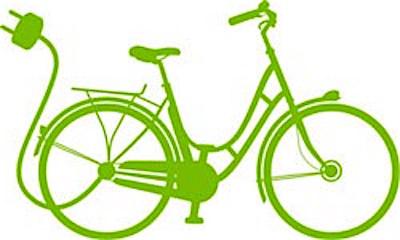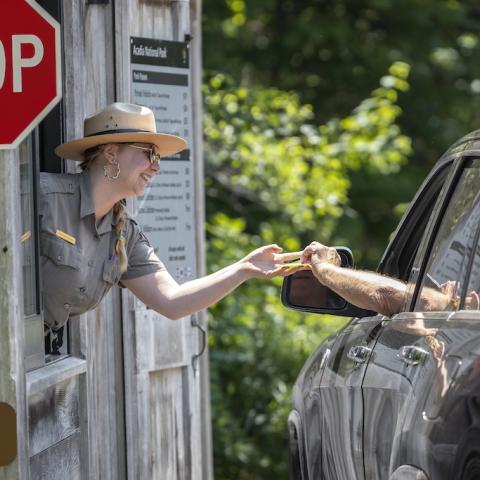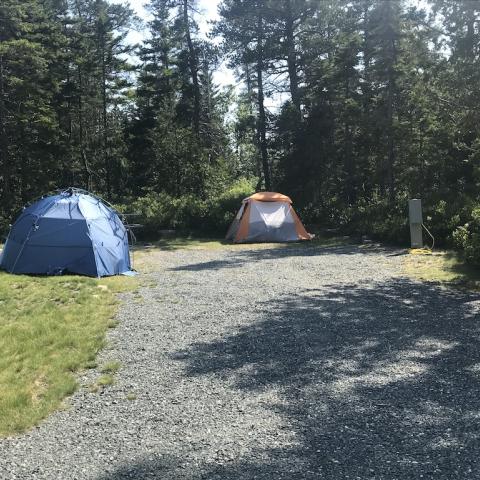
eBike riders caught on the Carriage Roads at Acadia National Park can be fined $130/NPS clipart
Opposition to allowing eBikes on non-motorized trails in the federal lands system has been voiced by dozens of conservation groups, who fear permitting the motorized bikes on those trails will create a "slippery slope" that will lead to future problems with managing those trails.
In a letter to the chief of the U.S. Forest Service, the acting director of the National Park Service, and the acting director of the U.S. Bureau of Land Management, the groups stated that they "oppose any effort that would allow any class of vehicle with a motor – including all classes of e-bikes, which by definition have a motor – to be allowed on non-motorized trails."
The issue came to light earlier this summer at Acadia National Park in Maine, where eBike users were told they could not ride on the Carriage Roads that wind through the park on Mount Desert Island. Fines for those caught on the roads start at $130, according to the park's website.
Discussion of that ban on National Parks Traveler spurred comments from many eBike users who said the bikes allow them to enjoy areas of parks that they normally couldn't walk to due to declining health.
"Apart from ebike commuters, I believe you will find ebikers to be an older, less fit demographic with some medical issues. We are not speed focused. Don't shut us out without at least a trial period," wrote DML.
In Traveler's weekly podcast, Kristen Brengel of the National Parks Conservation Association and Phil Francis of the Coalition to Protect America's National Parks voiced concern over allowing eBikes on non-motorized trails, and said the National Park Service needs to evaluate the issue carefully and fully and, if the decision is made to provide more access to the bikes beyond existing motorized routes, adopt strict regulations that outline where the various classes of eBikes are allowed to travel.
There are three "classes" of eBikes:
* Class 1: eBikes that are pedal-assist only, with no throttle, and have a maximum assisted speed of 20 mph.
* Class 2: eBikes that also have a maximum speed of 20 mph, but are throttle-assisted.
* Class 3: eBikes that are pedal-assist only, with no throttle, and a maximum assisted speed of 28 mph.
"Class 2 may not be suitable for singletrack mountainbike trails - it has been shown that they pose greater physical damage to trails due to the throttle-actuation," writes eBike manufacturer Bosch on its website. "Class 2 may be better suited for multi-use OHV trails designed for more rugged off-road vehicles.
"Class 3 eBikes are typically allowed on roads and on-road bike lanes (“curb to curb” infrastructure), but restricted from bike trails and multiuse paths. While a 20-mph maximum speed is achievable on a traditional bicycle, decision makers and agencies consider the greater top-assisted speed of a Class 3 eBike too fast for most bike paths and trails that are often shared with other trail users."
The conservation organizations, which range from the Addison Oaks Trail Riders to the Yankee Springs Trail Riders Association, say motorized vehicles should be kept separate from trails used by hikers and horseback riders.
"Non-motorized trails were created to ensure that the public could find recreational trail opportunities free from the ever-growing motorization and mechanization," reads the letter. "Millions of public land users including hikers, backpackers, hunters, horse packers, climbers, mountain bikers and many more, value non-motorized trails for recreation. Opening non-motorized trails to motors would forever change the backcountry experience for these users.
"We recognize that e-bikes have a place on public lands and generally should be allowed where motorized vehicles are permitted. The existing motorized trail system provides plentiful opportunities for e-bike use with tens of thousands of miles of trails currently open to their use."
There are groups organized to lobby for greater access for eBikes. PeopleforBikes strives to get more people across the country on bikes, and the growing popularity of eBikes hasn't been overlooked by this group. On their site are a number of papers discussing the benefits of eBikes. One even examines motorized mountain bikes and perceptions about them.
While the popularity of pedal-assist electric bikes (eBikes) generally is growing, electric-mountain bikes (eMTB) have not received a warm welcome by many within the mountain biking community. Anecdotally, a variety of concerns have been raised concerning eMTB use, including trail damage, trail confict, decreased trail access, and the perception that eMTB use is not “real” mountain biking or is “cheating.”
The outcome of that paper was that, "(T)hree predominant themes emerged: What is an eMTB?, Trails, and How should eMTBs be used? There was general confusion about the features and capabilities of eMTBs except by those who had previously used one. Commenters expressed concern over a variety of trail-related issues, including that eMTBs will damage trails similar to the way motorized vehicles do and that they could cause restricted access to some trail systems. There were inconsistent opinions on the use of eMTBs, where some comments saw riding mountain bikes as a 'rite of passage' and that using an eMTB was 'cheating.' There was some level of acknowledgement that eMTBs may be useful for promoting exercise, but this was mediated by the 'rite of passage' belief.'"
According to PeopleForBikes, there already are "more than 300,000 miles of singletrack, doubletrack, and natural surface roads accessible to motorized users."
In their letter of opposition, the conservation organizations wrote that allowing eBikes on non-motorized trails "is ill-advised and would undermine nearly a half century of management precedents and practices. First, allowing e-bikes on non-motorized trails would be un-manageable and send agencies down a slippery slope towards allowing further motorization of trails and potentially the entire backcountry. Federal land managers simply do not have the resources to police e-bikes on trails."
"Second, permitting e-bikes on non-motorized trails is contrary to long-standing 'travel management' laws and policies dating back to the Nixon administration that require all motorized recreational uses of our public lands to be confined to a system of designated roads, trails, and areas. Among other requirements, motorized trails must be located to minimize conflicts with other recreational uses of the public lands, as well as damage to soil, water, and other public land resources and harassment of wildlife."
Currently, the groups concluded, there are multiple opportunities for users to enjoy both motorized and non-motorized opportunities on public lands. However, they added, "(O)pening non-motorized trails to motorized bikes would effectively eliminate the non-motorized, primitive recreational opportunities."
Here's the list of those groups that signed the letter:
Addison Oaks Trail Riders
Allegan County Pleasure Riders
American Endurance Ride Conference
American Hiking Society
American Flyers
Appalachian Trail Conservancy
Back Country Horsemen of America (and the 30 BCH states and 196 chapters, full listing at end)
Bay Area Barns and Trails
Blue Ridge Horsemen's Association
Brighton Trail Riders Association
Canalway Partners-Board Member
Carolina Mountain Club
Colorado Mountain Club
Colorado Plateau Mountain Bike Trail Assoc, Inc.
Conserving Carolina
Continental Divide Trail Coalition
County Line Riders of Catalina, Inc
Dallas Off Road Bicycle Association (DORBA)
East Mountain Regional Trails Council
Fort Custer Horse Friends Association
Grand Valley Trails Alliance
Greater Yellowstone Coalition
Highlands Plateau Greenway
Ice Age Trail Alliance
Idaho Trails Association
Indiana Trails Community
Ionia Horse Trails Association
Kensington Trail Riders
Maybury Trail Riders
Michigan Horse Council
Michigan Trail Riders Association
Montana Wilderness Association
Montana Backcountry Alliance
National Parks Conservation Association
Natural Resources Council of Maine
Nickel Plate Trail, Inc
North Carolina Horse Council
North Country Trail Association Incorporated
Oregon Equestrian Trails
Oregon Horse Council
Overmountain Victory Trail Association
Pacific Crest Trail Association
Partnership for the National Trails System
Pinckney Trail Riders Association
Pisgah Trailblazers
Pontiac Lake Horseman’s Association
Proud Lake Trail Riders
Quiet Trails Group
Rose Oaks Equine Adventurers
San Luis Valley Ecosystem Council
Tri-County Horse Association
The Wilderness Society
Winter Wildlands Alliance
Yankee Springs Trail Riders Association




 Support Essential Coverage of Essential Places
Support Essential Coverage of Essential Places







Comments
I'm curious about other parts of the world where they do allow ebikes on trails, how do they do it everywhere else without problems? In many European countries you can ride a bike or ebike on any trails including hiking trails and they have no issues. In Canada and the UK you can ride a ebike on all MTB trails and they dont have issues as well. They don't all of a sudden have motorcycles going on the trails because they allow ebikes and they're not hitting hikers on the trails, so why is it always so backwards in the USA with regards to these issues? Just look at what other countries have done and what issues have occured, learn from their experiences since they're way ahead of us when it comes to the freedom of outdoor land usage. British Columbia is the mecca for mountain biking and they allow ebikes on trails and have no problems, why should we have issues?
This is an idiotic and elitist debate. Ebikes are nearly silent, are zero emissions, take up no more space on the trail than a normal bike, and back in my younger days, I've hit speeds on a regular bike at least comparable to a class 3 ebike's top speed, so speed isn't an issue either. I can understand why motorcycles are banned. They're loud, they're big and they can do highway speeds. Although it's a cycle with a motor, an ebike is not a motorcycle. An idiot on a regular bike is just as dangerous as an idiot on an ebike. I have nearly been mowed down several times by reckless riders on regular bikes, but never once by an ebike. Of course it can happen, but my point is that it's the rider, not the bike. The only possible reasons anyone could be opposed to ebikes are 1) they're ignorant as to what an ebike is and what it's capable of, 2) they're one of the elitist bike snobs opposed to anyone who's getting a little help from a motor, 3) they want to keep people off the trail so they can hog it more for themselves, or 4) they're just a funsucking killjoy opposed to the idea of someone a little older or with physical issues having some enjoyment. Since it's all about motors, what about hoverrounds or motorized wheelchairs? You can plow into someone on one of those and injure them, too. An ebike is just an assistive bike just like a motorized wheelchair is an assistive wheelchair. If you let bikes on a trail you should let ebikes on the trail. It's that simple.
Unfortunately most people have no skills and on a motorized rocket are a danger to the rest of us. You feel so strongly about it go to moto cross pa where you belong
This is such horse pucky. I invite this older "disabled" woman to try to walk on any Montana trail on weekends or holidays. The majority of ebike users are wealthy middled aged people and their spoiled kids with zero manners, taught by parents to be entitled. Normal people in trail areas cannot afford ebikes. It is freaking dangerous with yahoos quietly overtaking hikers with young children, todlers and dogs at 2 to 5X their speed without any warning but a barrage of explitives and nasty comments on the way by. It hurts their fake STRAVA times if the have to slow down. Check out the Emergency Room statistics aboiut what happens to pedestrians hit by e-bikers as well as e-bikers who can't handle their motored speed and crash into trees or off precipices. This is a rich, entitled "me first" group assisted with the proprietors of expensive light motorcycles jealous that they can't control even the wilderness paths that normal humans love to walk without being startled, yelled at or injured by the rich. Get a motorized wheelchair that will control your speed if you are disabled.